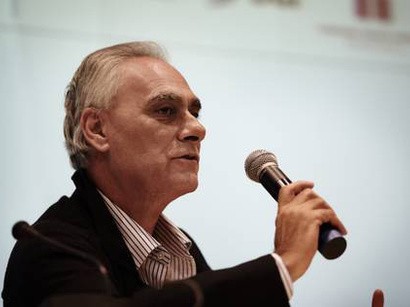By Aslak Sira Myhre
OSLO: When terror struck Oslo, many in the West’s first response was to blame Muslims. In pubs and on the streets of Oslo, girls wearing headscarves and boys who looked South Asian were immediately harassed. On Facebook, Muslims and immigration-friendly politicians were slandered. It was only when it was clear that the terrorist was a white, native Norwegian — a Muslim hater and not a Muslim — that the calm, collective reaction my country is generally so proud of began.
For decades, political violence in this country has been almost the sole preserve of a few neo-Nazis and other racist groups. During the 1970s they exploded bombs in left-wing bookstores and at a May Day demonstration. In the 1980s two people were executed for betraying a neo-Nazi group, and in the past two decades, two Norwegian boys — both ethnic minorities — were killed by racist hoodlums.
But even with this history, when the devastating hammerhead of terror hit us, we looked in the direction of the Muslim world. For at least ten years we have been taught that terror comes from “the East”, that an Arab is suspicious and that even mainstream Muslims are somehow tainted by extremist ideologies. We regularly see people of color being examined in private rooms in airport security and we have endless debates on the limits of “our” tolerance.
For ten years, Norway has partaken in the American wars in the Middle East, and slowly the Muslim world has become the “other”. We have begun to think that what differentiates “us” from “them” is the ability to slaughter civilians in cold blood. This thinking was all too visible in the shift in reaction, in Norway and the rest of the world, when it became clear that the madman was one of “our own”.
When a mad person with a Muslim background commits an act of terrorism, it is seen as being a result of his or her religion. In these cases, the terrorist’s madness is explained by religious fundamentalism. But when a non-Muslim, right-wing extremist commits the same kind of atrocity, the madness is said to result from something clinical. In short, our perception has become that a Muslim terrorist is mad because he is Muslim, but a Christian terrorist is a terrorist because he is mad.
One of the most frightening things in the aftermath of the July atrocities in which 77 people were killed, is that Anders Breivik’s manifesto makes clear that his sort of political madness is not unknown to us. On the contrary, many of his words have been used time and again in Norway in recent years. Phrases he used, such as “secret Islamification” and “Muslim takeover”, have appeared not only on obscure websites but are also on television and radio, in news articles and in the general immigration debate.
All over the West we have grown used to hearing fear-mongering and conspiracies about an emerging “Eurabia”. For example, rumors proliferate that Muslim women give birth to many children in order to take over Europe, that “their” culture is less developed than “ours”, that “their” religion is more inclined toward war and that “their” humanity is somehow less than ours.
What was considered extreme ideology and hateful speech 25 years ago has become commonplace today — not just in online debates but far into academic circles in Norway.
Clearly nobody but the killer bears responsibility for the atrocities in Oslo. But our society has a responsibility to shift our public debate. We are responsible for the wars we wage, the words we use and the way we treat people who are different from us. This is a responsibility we in Norway and the rest of the West have not taken in recent years.
If something good might come out of the Oslo terror, I hope it will be a change in the way we talk and think about “others”. Our first task should be to grant people the same humanity — regardless of gender, sexual orientation, nation or religion.
Aslak Sira Myhre is Director of the House of Literature in Oslo, an author and the former leader of the Red Electoral Alliance. This article was written for the Common Ground News Service (CGNews).

